Digital Technology & Crisis Management in Hospitality: Rosewood Hotel
VerifiedAdded on 2023/06/12
|30
|6105
|142
Report
AI Summary
This research project investigates the role of digital technologies in crisis management within the hospitality industry, focusing on Rosewood Hotel as a case study. The study aims to identify the concept of crisis management, evaluate the role of digital technologies in the hospitality sector, determine how these technologies assist in managing crises, and assess their impact in overcoming the COVID-19 crisis. Using both primary and secondary data, the research employs a deductive approach to justify work-related decisions and explores how digital technologies like IoT enhance operational efficiency, improve customer experiences, and provide backup communication plans during crises. The literature review highlights the importance of digital techniques in minimizing damage from crises and enabling businesses to continue operations during challenging times like the COVID-19 pandemic. The findings and recommendations provide insights into leveraging digital technologies for effective crisis management in the hospitality industry. Desklib provides access to similar research papers and solved assignments for students.
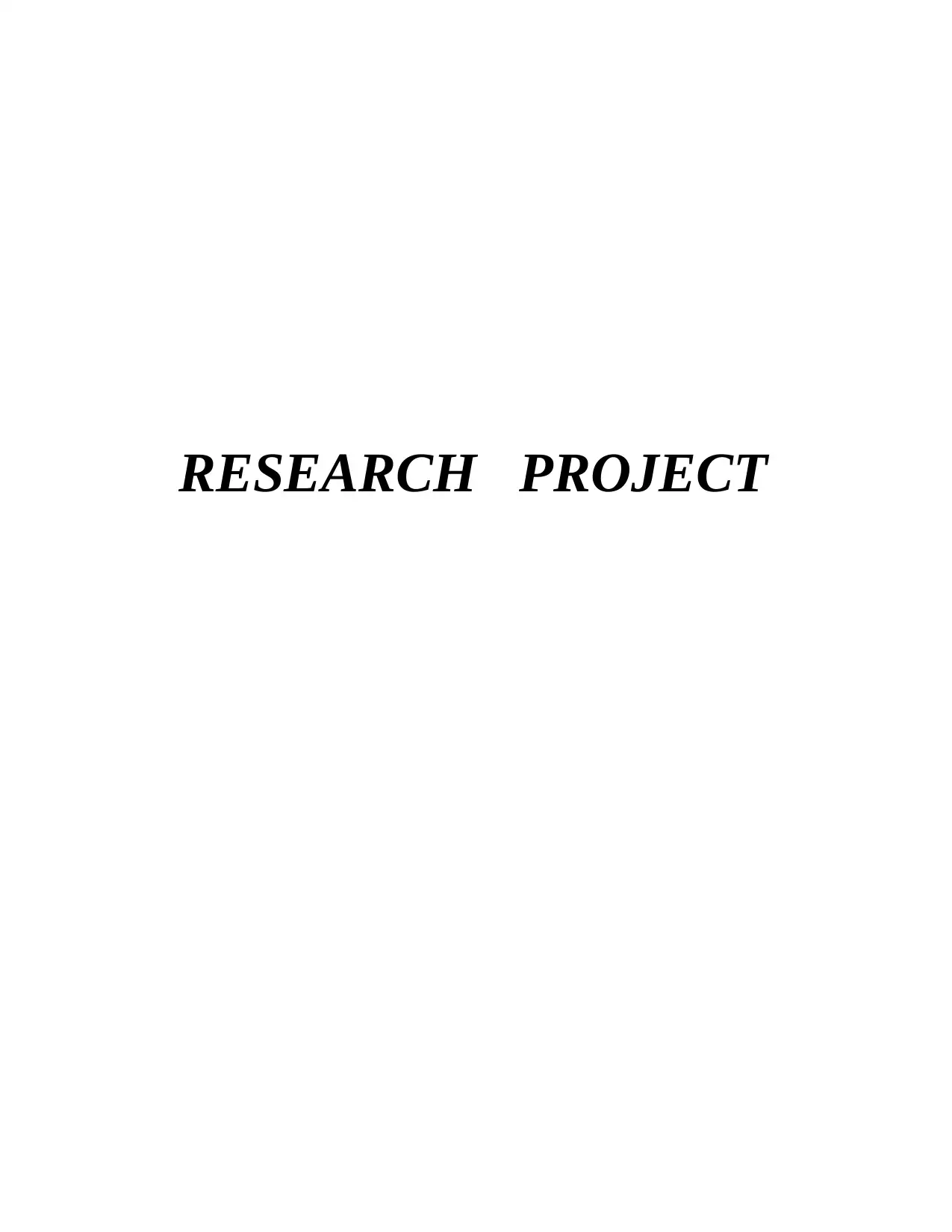
RESEARCH PROJECT
Paraphrase This Document
Need a fresh take? Get an instant paraphrase of this document with our AI Paraphraser
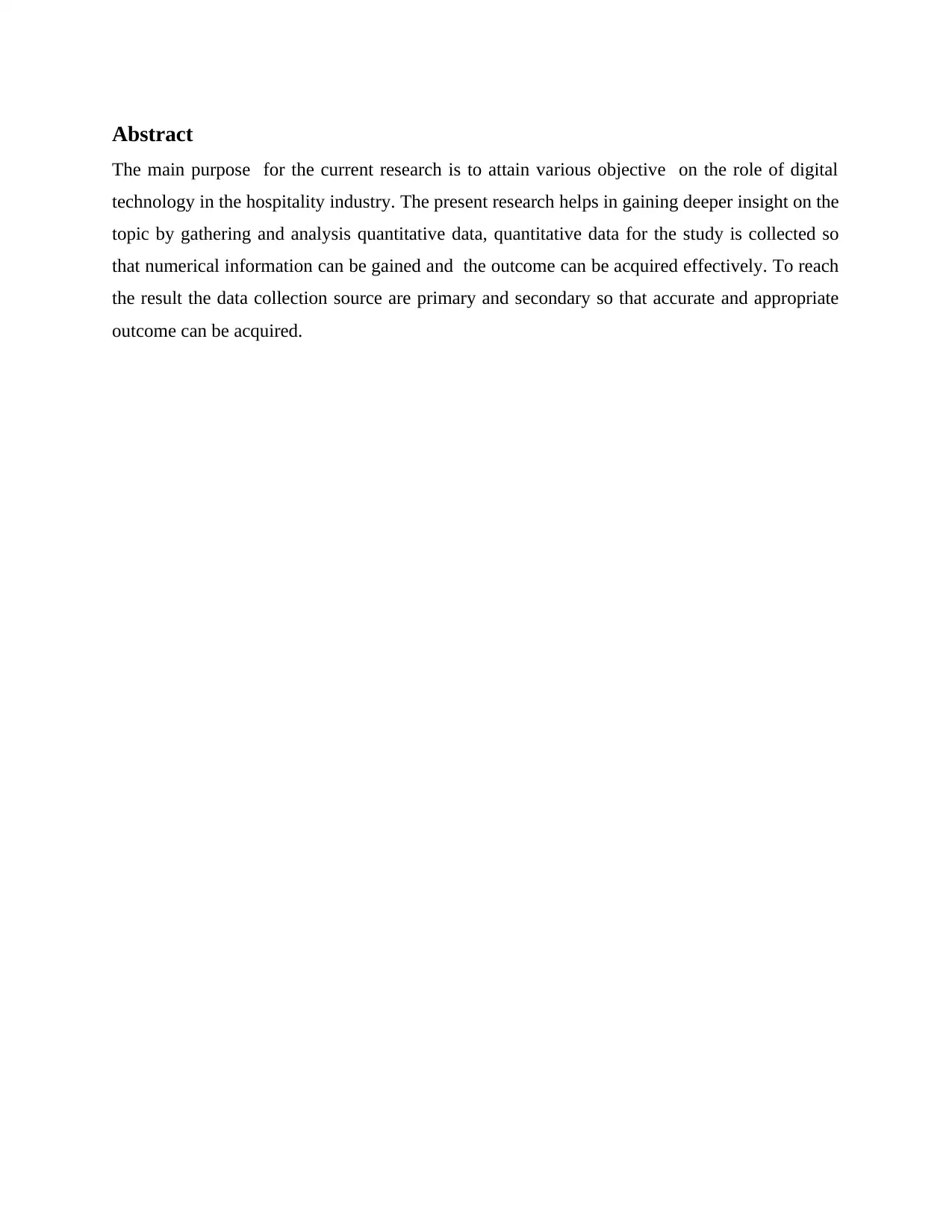
Abstract
The main purpose for the current research is to attain various objective on the role of digital
technology in the hospitality industry. The present research helps in gaining deeper insight on the
topic by gathering and analysis quantitative data, quantitative data for the study is collected so
that numerical information can be gained and the outcome can be acquired effectively. To reach
the result the data collection source are primary and secondary so that accurate and appropriate
outcome can be acquired.
The main purpose for the current research is to attain various objective on the role of digital
technology in the hospitality industry. The present research helps in gaining deeper insight on the
topic by gathering and analysis quantitative data, quantitative data for the study is collected so
that numerical information can be gained and the outcome can be acquired effectively. To reach
the result the data collection source are primary and secondary so that accurate and appropriate
outcome can be acquired.
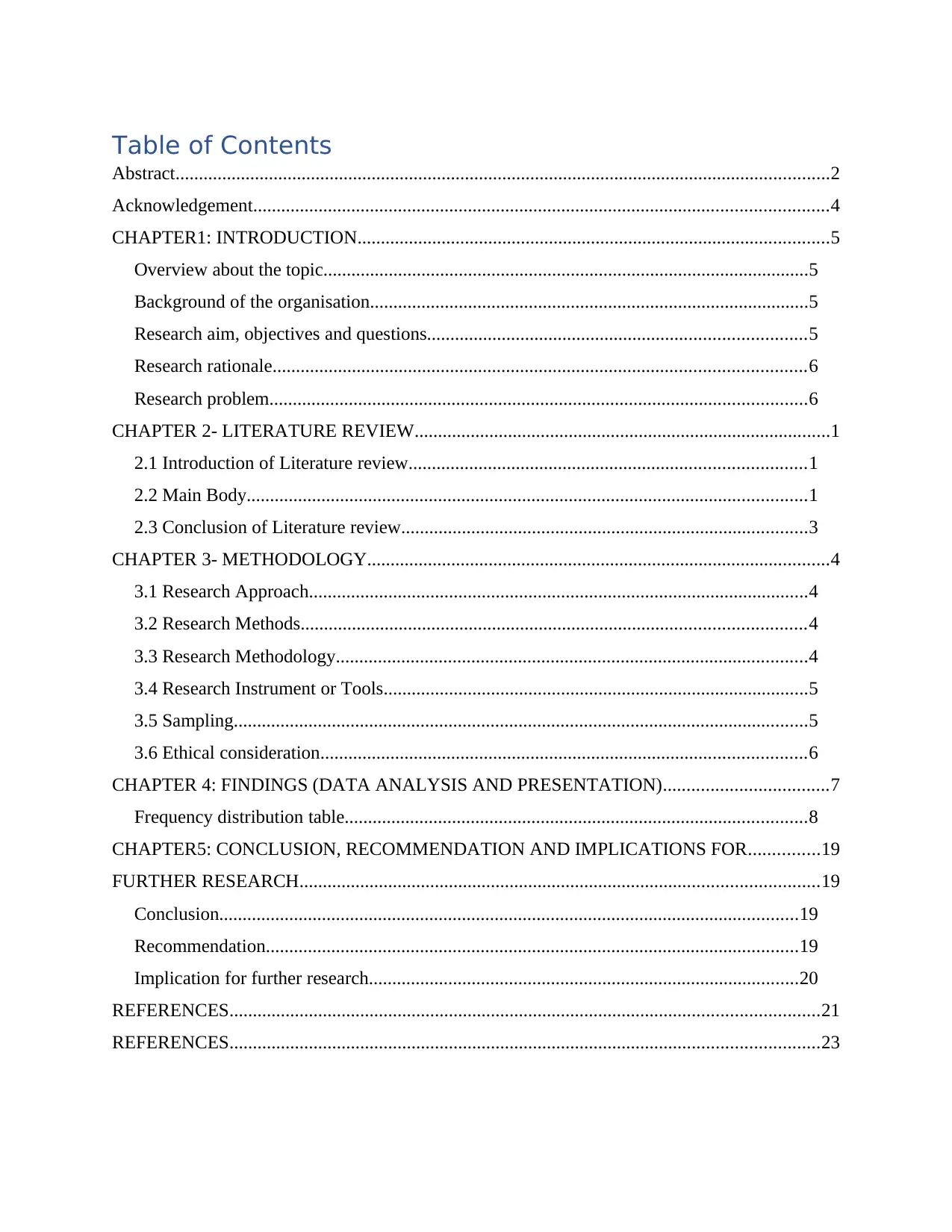
Table of Contents
Abstract............................................................................................................................................2
Acknowledgement...........................................................................................................................4
CHAPTER1: INTRODUCTION.....................................................................................................5
Overview about the topic........................................................................................................5
Background of the organisation..............................................................................................5
Research aim, objectives and questions.................................................................................5
Research rationale..................................................................................................................6
Research problem...................................................................................................................6
CHAPTER 2- LITERATURE REVIEW.........................................................................................1
2.1 Introduction of Literature review.....................................................................................1
2.2 Main Body........................................................................................................................1
2.3 Conclusion of Literature review.......................................................................................3
CHAPTER 3- METHODOLOGY...................................................................................................4
3.1 Research Approach...........................................................................................................4
3.2 Research Methods............................................................................................................4
3.3 Research Methodology.....................................................................................................4
3.4 Research Instrument or Tools...........................................................................................5
3.5 Sampling...........................................................................................................................5
3.6 Ethical consideration........................................................................................................6
CHAPTER 4: FINDINGS (DATA ANALYSIS AND PRESENTATION)...................................7
Frequency distribution table...................................................................................................8
CHAPTER5: CONCLUSION, RECOMMENDATION AND IMPLICATIONS FOR...............19
FURTHER RESEARCH...............................................................................................................19
Conclusion............................................................................................................................19
Recommendation..................................................................................................................19
Implication for further research............................................................................................20
REFERENCES..............................................................................................................................21
REFERENCES..............................................................................................................................23
Abstract............................................................................................................................................2
Acknowledgement...........................................................................................................................4
CHAPTER1: INTRODUCTION.....................................................................................................5
Overview about the topic........................................................................................................5
Background of the organisation..............................................................................................5
Research aim, objectives and questions.................................................................................5
Research rationale..................................................................................................................6
Research problem...................................................................................................................6
CHAPTER 2- LITERATURE REVIEW.........................................................................................1
2.1 Introduction of Literature review.....................................................................................1
2.2 Main Body........................................................................................................................1
2.3 Conclusion of Literature review.......................................................................................3
CHAPTER 3- METHODOLOGY...................................................................................................4
3.1 Research Approach...........................................................................................................4
3.2 Research Methods............................................................................................................4
3.3 Research Methodology.....................................................................................................4
3.4 Research Instrument or Tools...........................................................................................5
3.5 Sampling...........................................................................................................................5
3.6 Ethical consideration........................................................................................................6
CHAPTER 4: FINDINGS (DATA ANALYSIS AND PRESENTATION)...................................7
Frequency distribution table...................................................................................................8
CHAPTER5: CONCLUSION, RECOMMENDATION AND IMPLICATIONS FOR...............19
FURTHER RESEARCH...............................................................................................................19
Conclusion............................................................................................................................19
Recommendation..................................................................................................................19
Implication for further research............................................................................................20
REFERENCES..............................................................................................................................21
REFERENCES..............................................................................................................................23
⊘ This is a preview!⊘
Do you want full access?
Subscribe today to unlock all pages.

Trusted by 1+ million students worldwide

Acknowledgement
I would like to express my gratitude and appreciation to my professor for providing me the
opportunity to execute the investigation on the topic role of digital technology. I am very
grateful that they provide me all the necessary guideline so that project can be carry out
effectively.
I would also like to thanks my parents and family for supporting me so that project can be
completed in timely manner.
I would like to express my gratitude and appreciation to my professor for providing me the
opportunity to execute the investigation on the topic role of digital technology. I am very
grateful that they provide me all the necessary guideline so that project can be carry out
effectively.
I would also like to thanks my parents and family for supporting me so that project can be
completed in timely manner.
Paraphrase This Document
Need a fresh take? Get an instant paraphrase of this document with our AI Paraphraser
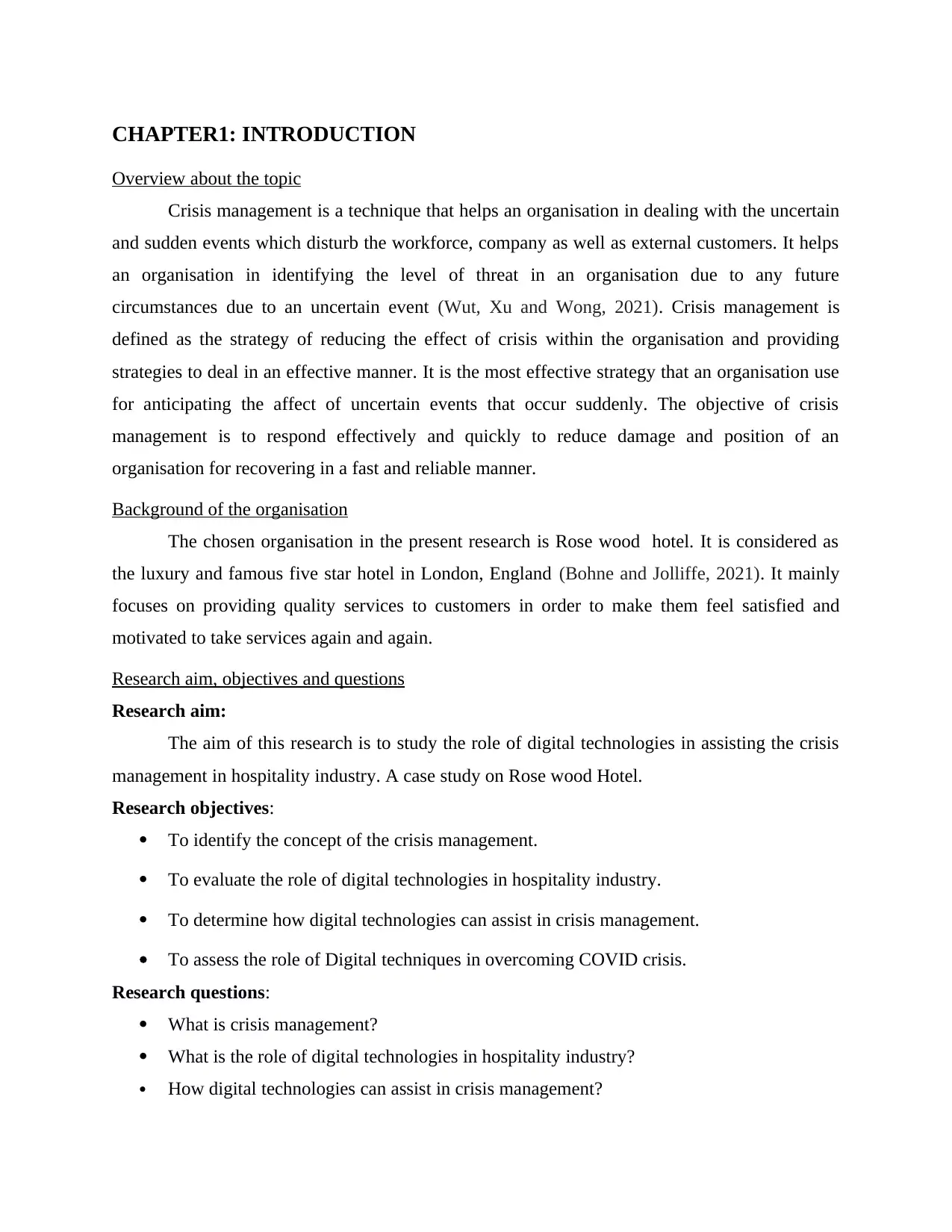
CHAPTER1: INTRODUCTION
Overview about the topic
Crisis management is a technique that helps an organisation in dealing with the uncertain
and sudden events which disturb the workforce, company as well as external customers. It helps
an organisation in identifying the level of threat in an organisation due to any future
circumstances due to an uncertain event (Wut, Xu and Wong, 2021). Crisis management is
defined as the strategy of reducing the effect of crisis within the organisation and providing
strategies to deal in an effective manner. It is the most effective strategy that an organisation use
for anticipating the affect of uncertain events that occur suddenly. The objective of crisis
management is to respond effectively and quickly to reduce damage and position of an
organisation for recovering in a fast and reliable manner.
Background of the organisation
The chosen organisation in the present research is Rose wood hotel. It is considered as
the luxury and famous five star hotel in London, England (Bohne and Jolliffe, 2021). It mainly
focuses on providing quality services to customers in order to make them feel satisfied and
motivated to take services again and again.
Research aim, objectives and questions
Research aim:
The aim of this research is to study the role of digital technologies in assisting the crisis
management in hospitality industry. A case study on Rose wood Hotel.
Research objectives:
To identify the concept of the crisis management.
To evaluate the role of digital technologies in hospitality industry.
To determine how digital technologies can assist in crisis management.
To assess the role of Digital techniques in overcoming COVID crisis.
Research questions:
What is crisis management?
What is the role of digital technologies in hospitality industry?
How digital technologies can assist in crisis management?
Overview about the topic
Crisis management is a technique that helps an organisation in dealing with the uncertain
and sudden events which disturb the workforce, company as well as external customers. It helps
an organisation in identifying the level of threat in an organisation due to any future
circumstances due to an uncertain event (Wut, Xu and Wong, 2021). Crisis management is
defined as the strategy of reducing the effect of crisis within the organisation and providing
strategies to deal in an effective manner. It is the most effective strategy that an organisation use
for anticipating the affect of uncertain events that occur suddenly. The objective of crisis
management is to respond effectively and quickly to reduce damage and position of an
organisation for recovering in a fast and reliable manner.
Background of the organisation
The chosen organisation in the present research is Rose wood hotel. It is considered as
the luxury and famous five star hotel in London, England (Bohne and Jolliffe, 2021). It mainly
focuses on providing quality services to customers in order to make them feel satisfied and
motivated to take services again and again.
Research aim, objectives and questions
Research aim:
The aim of this research is to study the role of digital technologies in assisting the crisis
management in hospitality industry. A case study on Rose wood Hotel.
Research objectives:
To identify the concept of the crisis management.
To evaluate the role of digital technologies in hospitality industry.
To determine how digital technologies can assist in crisis management.
To assess the role of Digital techniques in overcoming COVID crisis.
Research questions:
What is crisis management?
What is the role of digital technologies in hospitality industry?
How digital technologies can assist in crisis management?
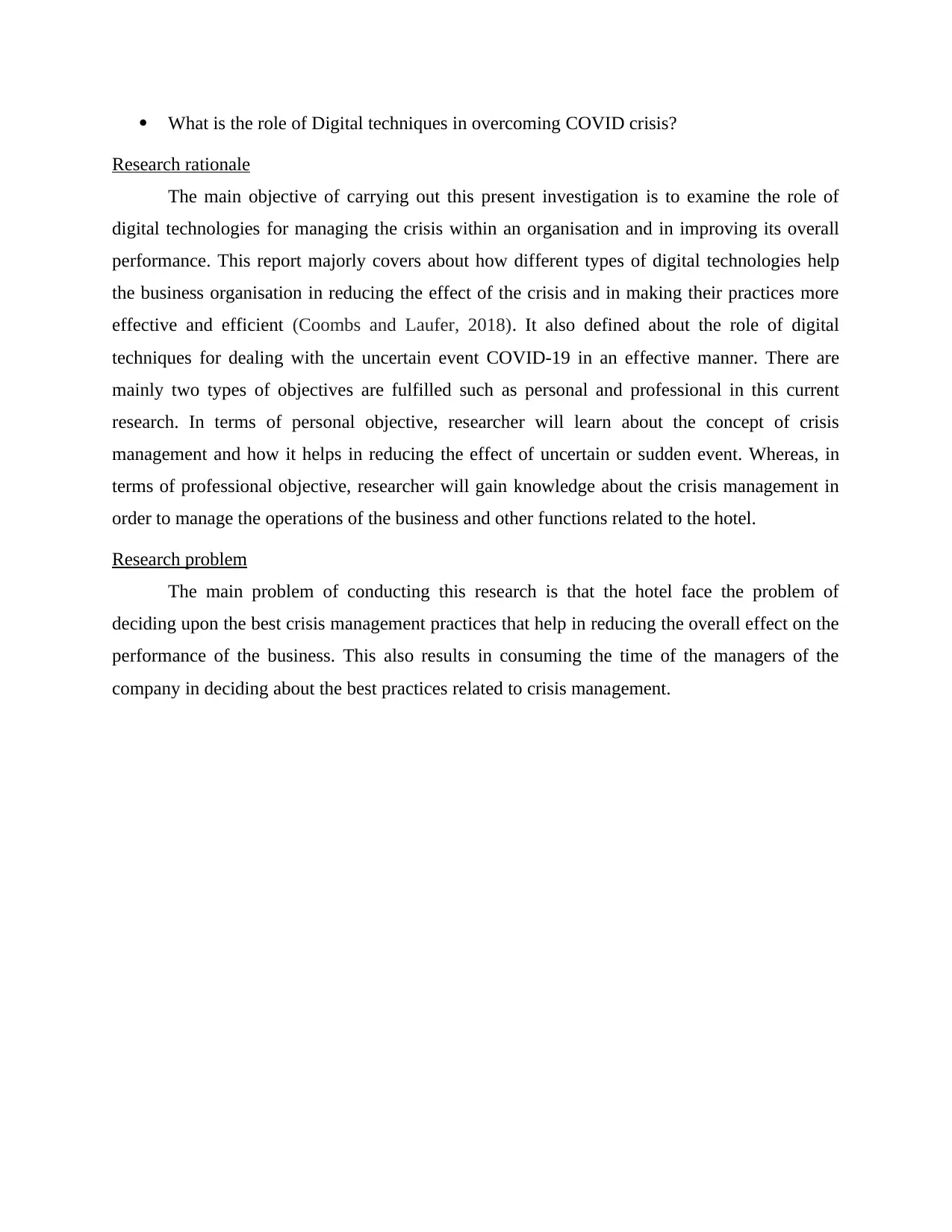
What is the role of Digital techniques in overcoming COVID crisis?
Research rationale
The main objective of carrying out this present investigation is to examine the role of
digital technologies for managing the crisis within an organisation and in improving its overall
performance. This report majorly covers about how different types of digital technologies help
the business organisation in reducing the effect of the crisis and in making their practices more
effective and efficient (Coombs and Laufer, 2018). It also defined about the role of digital
techniques for dealing with the uncertain event COVID-19 in an effective manner. There are
mainly two types of objectives are fulfilled such as personal and professional in this current
research. In terms of personal objective, researcher will learn about the concept of crisis
management and how it helps in reducing the effect of uncertain or sudden event. Whereas, in
terms of professional objective, researcher will gain knowledge about the crisis management in
order to manage the operations of the business and other functions related to the hotel.
Research problem
The main problem of conducting this research is that the hotel face the problem of
deciding upon the best crisis management practices that help in reducing the overall effect on the
performance of the business. This also results in consuming the time of the managers of the
company in deciding about the best practices related to crisis management.
Research rationale
The main objective of carrying out this present investigation is to examine the role of
digital technologies for managing the crisis within an organisation and in improving its overall
performance. This report majorly covers about how different types of digital technologies help
the business organisation in reducing the effect of the crisis and in making their practices more
effective and efficient (Coombs and Laufer, 2018). It also defined about the role of digital
techniques for dealing with the uncertain event COVID-19 in an effective manner. There are
mainly two types of objectives are fulfilled such as personal and professional in this current
research. In terms of personal objective, researcher will learn about the concept of crisis
management and how it helps in reducing the effect of uncertain or sudden event. Whereas, in
terms of professional objective, researcher will gain knowledge about the crisis management in
order to manage the operations of the business and other functions related to the hotel.
Research problem
The main problem of conducting this research is that the hotel face the problem of
deciding upon the best crisis management practices that help in reducing the overall effect on the
performance of the business. This also results in consuming the time of the managers of the
company in deciding about the best practices related to crisis management.
⊘ This is a preview!⊘
Do you want full access?
Subscribe today to unlock all pages.

Trusted by 1+ million students worldwide
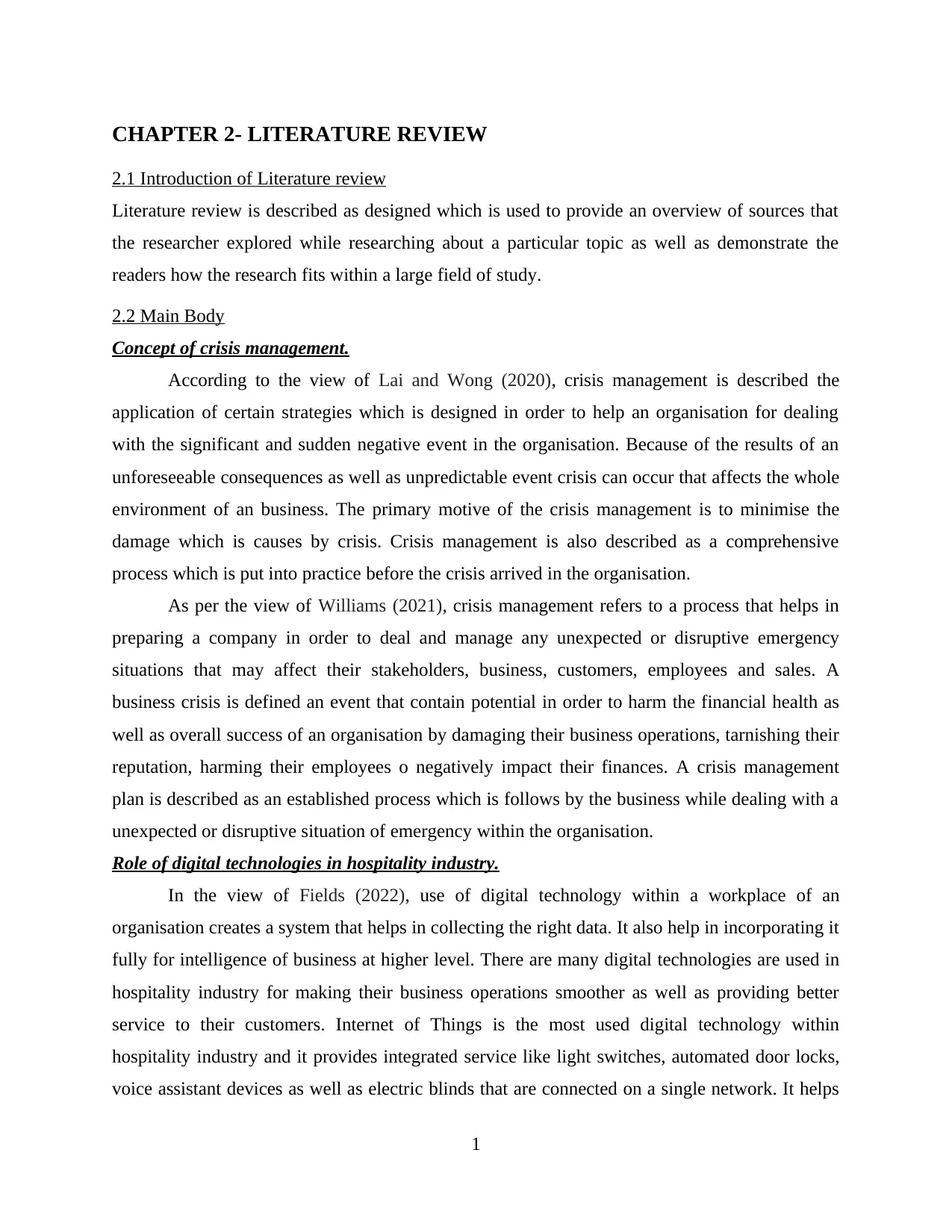
CHAPTER 2- LITERATURE REVIEW
2.1 Introduction of Literature review
Literature review is described as designed which is used to provide an overview of sources that
the researcher explored while researching about a particular topic as well as demonstrate the
readers how the research fits within a large field of study.
2.2 Main Body
Concept of crisis management.
According to the view of Lai and Wong (2020), crisis management is described the
application of certain strategies which is designed in order to help an organisation for dealing
with the significant and sudden negative event in the organisation. Because of the results of an
unforeseeable consequences as well as unpredictable event crisis can occur that affects the whole
environment of an business. The primary motive of the crisis management is to minimise the
damage which is causes by crisis. Crisis management is also described as a comprehensive
process which is put into practice before the crisis arrived in the organisation.
As per the view of Williams (2021), crisis management refers to a process that helps in
preparing a company in order to deal and manage any unexpected or disruptive emergency
situations that may affect their stakeholders, business, customers, employees and sales. A
business crisis is defined an event that contain potential in order to harm the financial health as
well as overall success of an organisation by damaging their business operations, tarnishing their
reputation, harming their employees o negatively impact their finances. A crisis management
plan is described as an established process which is follows by the business while dealing with a
unexpected or disruptive situation of emergency within the organisation.
Role of digital technologies in hospitality industry.
In the view of Fields (2022), use of digital technology within a workplace of an
organisation creates a system that helps in collecting the right data. It also help in incorporating it
fully for intelligence of business at higher level. There are many digital technologies are used in
hospitality industry for making their business operations smoother as well as providing better
service to their customers. Internet of Things is the most used digital technology within
hospitality industry and it provides integrated service like light switches, automated door locks,
voice assistant devices as well as electric blinds that are connected on a single network. It helps
1
2.1 Introduction of Literature review
Literature review is described as designed which is used to provide an overview of sources that
the researcher explored while researching about a particular topic as well as demonstrate the
readers how the research fits within a large field of study.
2.2 Main Body
Concept of crisis management.
According to the view of Lai and Wong (2020), crisis management is described the
application of certain strategies which is designed in order to help an organisation for dealing
with the significant and sudden negative event in the organisation. Because of the results of an
unforeseeable consequences as well as unpredictable event crisis can occur that affects the whole
environment of an business. The primary motive of the crisis management is to minimise the
damage which is causes by crisis. Crisis management is also described as a comprehensive
process which is put into practice before the crisis arrived in the organisation.
As per the view of Williams (2021), crisis management refers to a process that helps in
preparing a company in order to deal and manage any unexpected or disruptive emergency
situations that may affect their stakeholders, business, customers, employees and sales. A
business crisis is defined an event that contain potential in order to harm the financial health as
well as overall success of an organisation by damaging their business operations, tarnishing their
reputation, harming their employees o negatively impact their finances. A crisis management
plan is described as an established process which is follows by the business while dealing with a
unexpected or disruptive situation of emergency within the organisation.
Role of digital technologies in hospitality industry.
In the view of Fields (2022), use of digital technology within a workplace of an
organisation creates a system that helps in collecting the right data. It also help in incorporating it
fully for intelligence of business at higher level. There are many digital technologies are used in
hospitality industry for making their business operations smoother as well as providing better
service to their customers. Internet of Things is the most used digital technology within
hospitality industry and it provides integrated service like light switches, automated door locks,
voice assistant devices as well as electric blinds that are connected on a single network. It helps
1
Paraphrase This Document
Need a fresh take? Get an instant paraphrase of this document with our AI Paraphraser
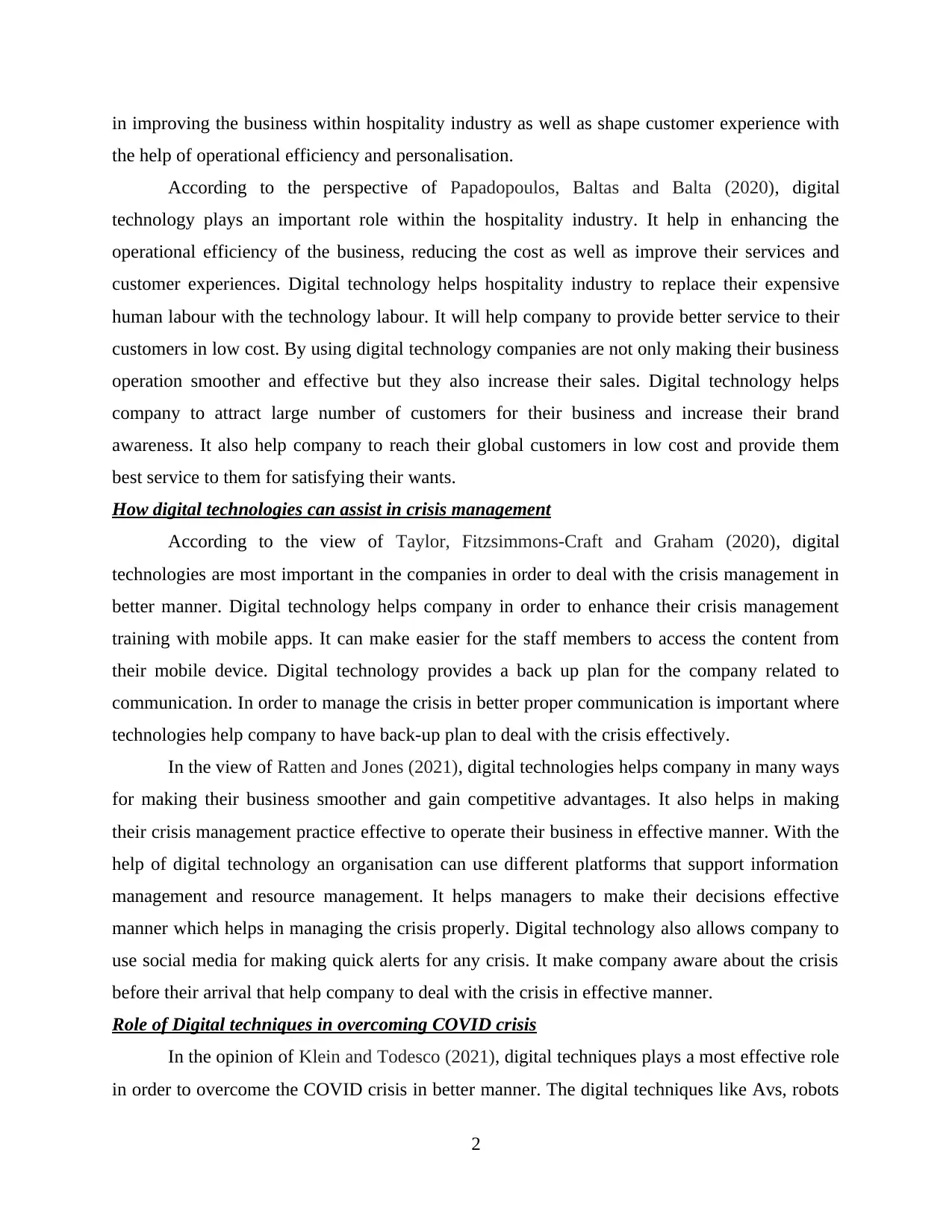
in improving the business within hospitality industry as well as shape customer experience with
the help of operational efficiency and personalisation.
According to the perspective of Papadopoulos, Baltas and Balta (2020), digital
technology plays an important role within the hospitality industry. It help in enhancing the
operational efficiency of the business, reducing the cost as well as improve their services and
customer experiences. Digital technology helps hospitality industry to replace their expensive
human labour with the technology labour. It will help company to provide better service to their
customers in low cost. By using digital technology companies are not only making their business
operation smoother and effective but they also increase their sales. Digital technology helps
company to attract large number of customers for their business and increase their brand
awareness. It also help company to reach their global customers in low cost and provide them
best service to them for satisfying their wants.
How digital technologies can assist in crisis management
According to the view of Taylor, Fitzsimmons‐Craft and Graham (2020), digital
technologies are most important in the companies in order to deal with the crisis management in
better manner. Digital technology helps company in order to enhance their crisis management
training with mobile apps. It can make easier for the staff members to access the content from
their mobile device. Digital technology provides a back up plan for the company related to
communication. In order to manage the crisis in better proper communication is important where
technologies help company to have back-up plan to deal with the crisis effectively.
In the view of Ratten and Jones (2021), digital technologies helps company in many ways
for making their business smoother and gain competitive advantages. It also helps in making
their crisis management practice effective to operate their business in effective manner. With the
help of digital technology an organisation can use different platforms that support information
management and resource management. It helps managers to make their decisions effective
manner which helps in managing the crisis properly. Digital technology also allows company to
use social media for making quick alerts for any crisis. It make company aware about the crisis
before their arrival that help company to deal with the crisis in effective manner.
Role of Digital techniques in overcoming COVID crisis
In the opinion of Klein and Todesco (2021), digital techniques plays a most effective role
in order to overcome the COVID crisis in better manner. The digital techniques like Avs, robots
2
the help of operational efficiency and personalisation.
According to the perspective of Papadopoulos, Baltas and Balta (2020), digital
technology plays an important role within the hospitality industry. It help in enhancing the
operational efficiency of the business, reducing the cost as well as improve their services and
customer experiences. Digital technology helps hospitality industry to replace their expensive
human labour with the technology labour. It will help company to provide better service to their
customers in low cost. By using digital technology companies are not only making their business
operation smoother and effective but they also increase their sales. Digital technology helps
company to attract large number of customers for their business and increase their brand
awareness. It also help company to reach their global customers in low cost and provide them
best service to them for satisfying their wants.
How digital technologies can assist in crisis management
According to the view of Taylor, Fitzsimmons‐Craft and Graham (2020), digital
technologies are most important in the companies in order to deal with the crisis management in
better manner. Digital technology helps company in order to enhance their crisis management
training with mobile apps. It can make easier for the staff members to access the content from
their mobile device. Digital technology provides a back up plan for the company related to
communication. In order to manage the crisis in better proper communication is important where
technologies help company to have back-up plan to deal with the crisis effectively.
In the view of Ratten and Jones (2021), digital technologies helps company in many ways
for making their business smoother and gain competitive advantages. It also helps in making
their crisis management practice effective to operate their business in effective manner. With the
help of digital technology an organisation can use different platforms that support information
management and resource management. It helps managers to make their decisions effective
manner which helps in managing the crisis properly. Digital technology also allows company to
use social media for making quick alerts for any crisis. It make company aware about the crisis
before their arrival that help company to deal with the crisis in effective manner.
Role of Digital techniques in overcoming COVID crisis
In the opinion of Klein and Todesco (2021), digital techniques plays a most effective role
in order to overcome the COVID crisis in better manner. The digital techniques like Avs, robots
2
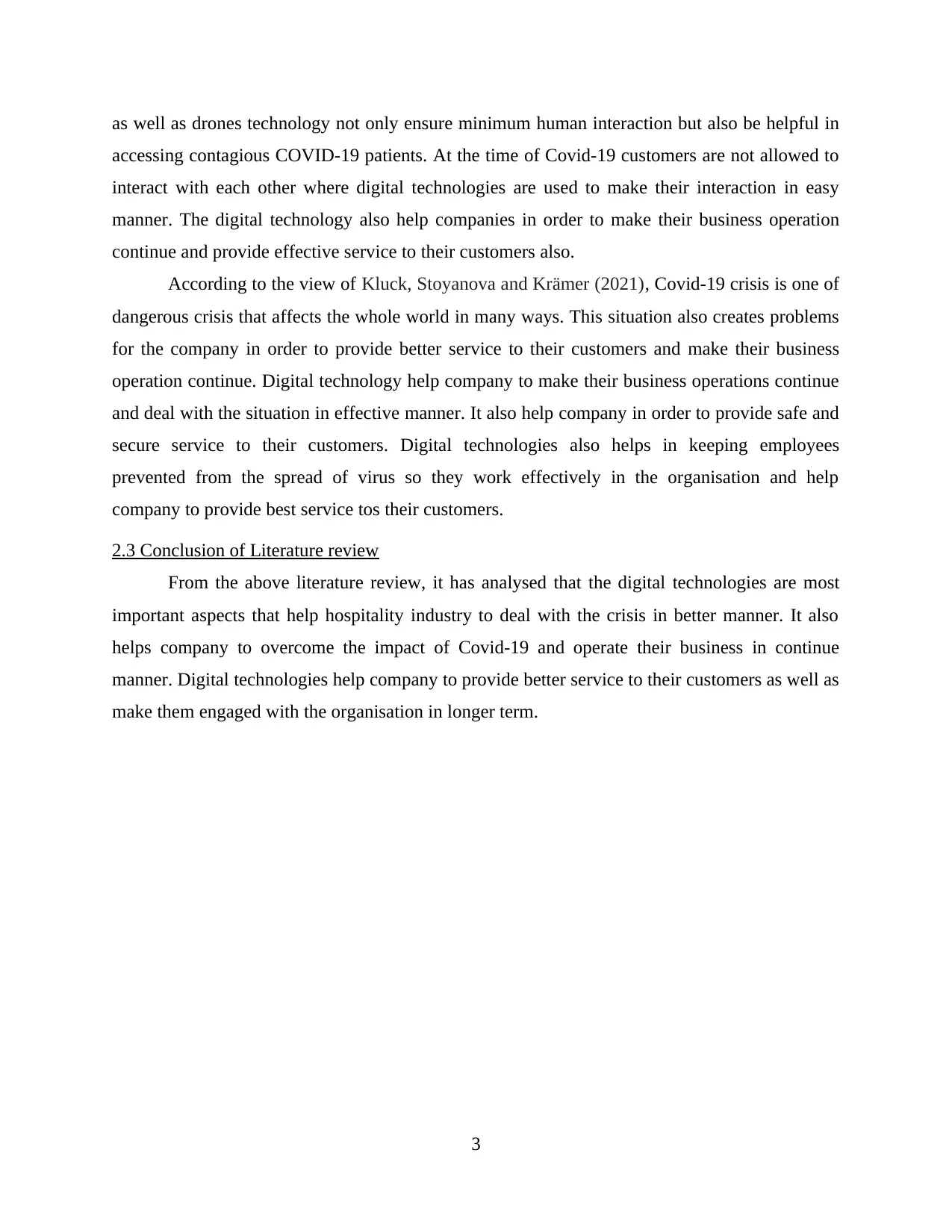
as well as drones technology not only ensure minimum human interaction but also be helpful in
accessing contagious COVID-19 patients. At the time of Covid-19 customers are not allowed to
interact with each other where digital technologies are used to make their interaction in easy
manner. The digital technology also help companies in order to make their business operation
continue and provide effective service to their customers also.
According to the view of Kluck, Stoyanova and Krämer (2021), Covid-19 crisis is one of
dangerous crisis that affects the whole world in many ways. This situation also creates problems
for the company in order to provide better service to their customers and make their business
operation continue. Digital technology help company to make their business operations continue
and deal with the situation in effective manner. It also help company in order to provide safe and
secure service to their customers. Digital technologies also helps in keeping employees
prevented from the spread of virus so they work effectively in the organisation and help
company to provide best service tos their customers.
2.3 Conclusion of Literature review
From the above literature review, it has analysed that the digital technologies are most
important aspects that help hospitality industry to deal with the crisis in better manner. It also
helps company to overcome the impact of Covid-19 and operate their business in continue
manner. Digital technologies help company to provide better service to their customers as well as
make them engaged with the organisation in longer term.
3
accessing contagious COVID-19 patients. At the time of Covid-19 customers are not allowed to
interact with each other where digital technologies are used to make their interaction in easy
manner. The digital technology also help companies in order to make their business operation
continue and provide effective service to their customers also.
According to the view of Kluck, Stoyanova and Krämer (2021), Covid-19 crisis is one of
dangerous crisis that affects the whole world in many ways. This situation also creates problems
for the company in order to provide better service to their customers and make their business
operation continue. Digital technology help company to make their business operations continue
and deal with the situation in effective manner. It also help company in order to provide safe and
secure service to their customers. Digital technologies also helps in keeping employees
prevented from the spread of virus so they work effectively in the organisation and help
company to provide best service tos their customers.
2.3 Conclusion of Literature review
From the above literature review, it has analysed that the digital technologies are most
important aspects that help hospitality industry to deal with the crisis in better manner. It also
helps company to overcome the impact of Covid-19 and operate their business in continue
manner. Digital technologies help company to provide better service to their customers as well as
make them engaged with the organisation in longer term.
3
⊘ This is a preview!⊘
Do you want full access?
Subscribe today to unlock all pages.

Trusted by 1+ million students worldwide
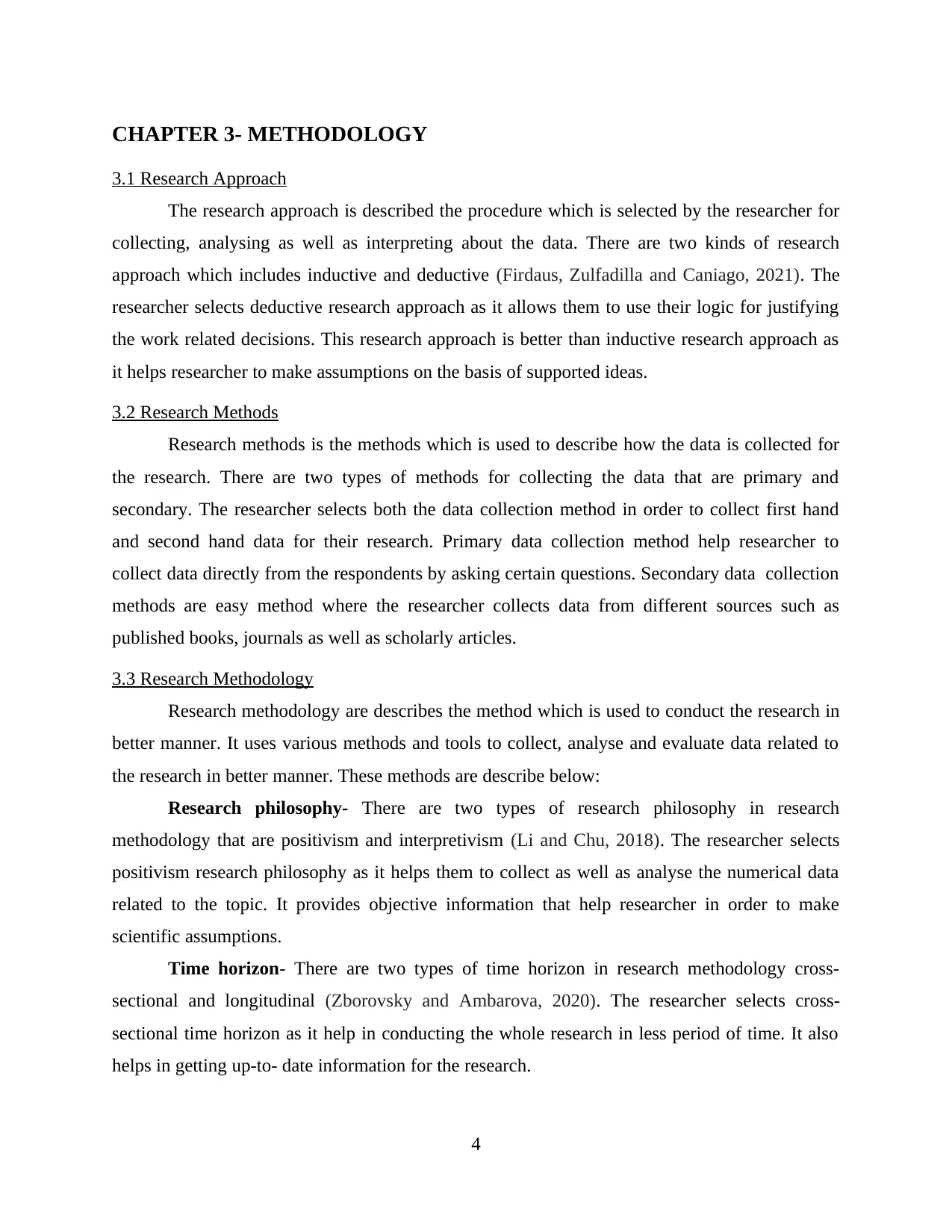
CHAPTER 3- METHODOLOGY
3.1 Research Approach
The research approach is described the procedure which is selected by the researcher for
collecting, analysing as well as interpreting about the data. There are two kinds of research
approach which includes inductive and deductive (Firdaus, Zulfadilla and Caniago, 2021). The
researcher selects deductive research approach as it allows them to use their logic for justifying
the work related decisions. This research approach is better than inductive research approach as
it helps researcher to make assumptions on the basis of supported ideas.
3.2 Research Methods
Research methods is the methods which is used to describe how the data is collected for
the research. There are two types of methods for collecting the data that are primary and
secondary. The researcher selects both the data collection method in order to collect first hand
and second hand data for their research. Primary data collection method help researcher to
collect data directly from the respondents by asking certain questions. Secondary data collection
methods are easy method where the researcher collects data from different sources such as
published books, journals as well as scholarly articles.
3.3 Research Methodology
Research methodology are describes the method which is used to conduct the research in
better manner. It uses various methods and tools to collect, analyse and evaluate data related to
the research in better manner. These methods are describe below:
Research philosophy- There are two types of research philosophy in research
methodology that are positivism and interpretivism (Li and Chu, 2018). The researcher selects
positivism research philosophy as it helps them to collect as well as analyse the numerical data
related to the topic. It provides objective information that help researcher in order to make
scientific assumptions.
Time horizon- There are two types of time horizon in research methodology cross-
sectional and longitudinal (Zborovsky and Ambarova, 2020). The researcher selects cross-
sectional time horizon as it help in conducting the whole research in less period of time. It also
helps in getting up-to- date information for the research.
4
3.1 Research Approach
The research approach is described the procedure which is selected by the researcher for
collecting, analysing as well as interpreting about the data. There are two kinds of research
approach which includes inductive and deductive (Firdaus, Zulfadilla and Caniago, 2021). The
researcher selects deductive research approach as it allows them to use their logic for justifying
the work related decisions. This research approach is better than inductive research approach as
it helps researcher to make assumptions on the basis of supported ideas.
3.2 Research Methods
Research methods is the methods which is used to describe how the data is collected for
the research. There are two types of methods for collecting the data that are primary and
secondary. The researcher selects both the data collection method in order to collect first hand
and second hand data for their research. Primary data collection method help researcher to
collect data directly from the respondents by asking certain questions. Secondary data collection
methods are easy method where the researcher collects data from different sources such as
published books, journals as well as scholarly articles.
3.3 Research Methodology
Research methodology are describes the method which is used to conduct the research in
better manner. It uses various methods and tools to collect, analyse and evaluate data related to
the research in better manner. These methods are describe below:
Research philosophy- There are two types of research philosophy in research
methodology that are positivism and interpretivism (Li and Chu, 2018). The researcher selects
positivism research philosophy as it helps them to collect as well as analyse the numerical data
related to the topic. It provides objective information that help researcher in order to make
scientific assumptions.
Time horizon- There are two types of time horizon in research methodology cross-
sectional and longitudinal (Zborovsky and Ambarova, 2020). The researcher selects cross-
sectional time horizon as it help in conducting the whole research in less period of time. It also
helps in getting up-to- date information for the research.
4
Paraphrase This Document
Need a fresh take? Get an instant paraphrase of this document with our AI Paraphraser
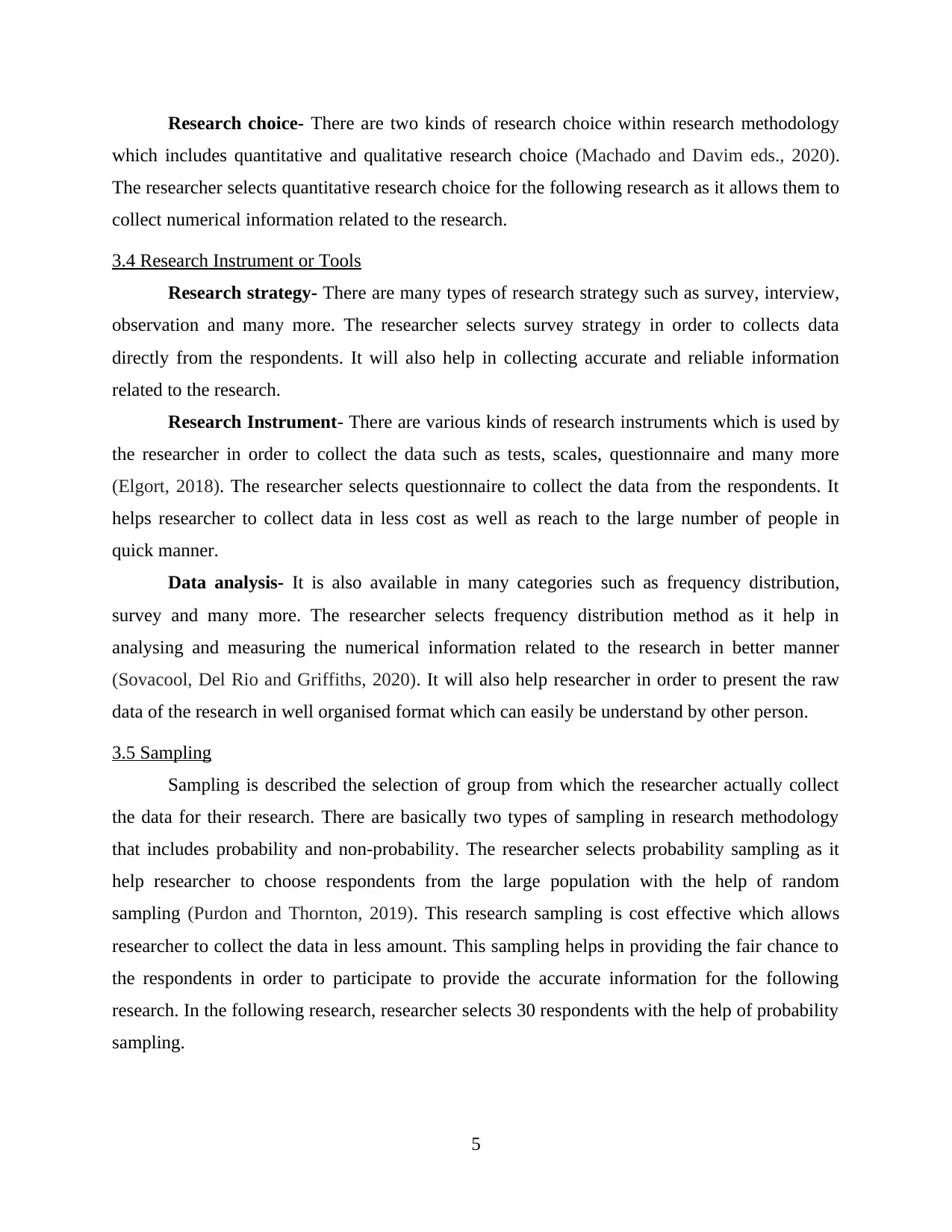
Research choice- There are two kinds of research choice within research methodology
which includes quantitative and qualitative research choice (Machado and Davim eds., 2020).
The researcher selects quantitative research choice for the following research as it allows them to
collect numerical information related to the research.
3.4 Research Instrument or Tools
Research strategy- There are many types of research strategy such as survey, interview,
observation and many more. The researcher selects survey strategy in order to collects data
directly from the respondents. It will also help in collecting accurate and reliable information
related to the research.
Research Instrument- There are various kinds of research instruments which is used by
the researcher in order to collect the data such as tests, scales, questionnaire and many more
(Elgort, 2018). The researcher selects questionnaire to collect the data from the respondents. It
helps researcher to collect data in less cost as well as reach to the large number of people in
quick manner.
Data analysis- It is also available in many categories such as frequency distribution,
survey and many more. The researcher selects frequency distribution method as it help in
analysing and measuring the numerical information related to the research in better manner
(Sovacool, Del Rio and Griffiths, 2020). It will also help researcher in order to present the raw
data of the research in well organised format which can easily be understand by other person.
3.5 Sampling
Sampling is described the selection of group from which the researcher actually collect
the data for their research. There are basically two types of sampling in research methodology
that includes probability and non-probability. The researcher selects probability sampling as it
help researcher to choose respondents from the large population with the help of random
sampling (Purdon and Thornton, 2019). This research sampling is cost effective which allows
researcher to collect the data in less amount. This sampling helps in providing the fair chance to
the respondents in order to participate to provide the accurate information for the following
research. In the following research, researcher selects 30 respondents with the help of probability
sampling.
5
which includes quantitative and qualitative research choice (Machado and Davim eds., 2020).
The researcher selects quantitative research choice for the following research as it allows them to
collect numerical information related to the research.
3.4 Research Instrument or Tools
Research strategy- There are many types of research strategy such as survey, interview,
observation and many more. The researcher selects survey strategy in order to collects data
directly from the respondents. It will also help in collecting accurate and reliable information
related to the research.
Research Instrument- There are various kinds of research instruments which is used by
the researcher in order to collect the data such as tests, scales, questionnaire and many more
(Elgort, 2018). The researcher selects questionnaire to collect the data from the respondents. It
helps researcher to collect data in less cost as well as reach to the large number of people in
quick manner.
Data analysis- It is also available in many categories such as frequency distribution,
survey and many more. The researcher selects frequency distribution method as it help in
analysing and measuring the numerical information related to the research in better manner
(Sovacool, Del Rio and Griffiths, 2020). It will also help researcher in order to present the raw
data of the research in well organised format which can easily be understand by other person.
3.5 Sampling
Sampling is described the selection of group from which the researcher actually collect
the data for their research. There are basically two types of sampling in research methodology
that includes probability and non-probability. The researcher selects probability sampling as it
help researcher to choose respondents from the large population with the help of random
sampling (Purdon and Thornton, 2019). This research sampling is cost effective which allows
researcher to collect the data in less amount. This sampling helps in providing the fair chance to
the respondents in order to participate to provide the accurate information for the following
research. In the following research, researcher selects 30 respondents with the help of probability
sampling.
5
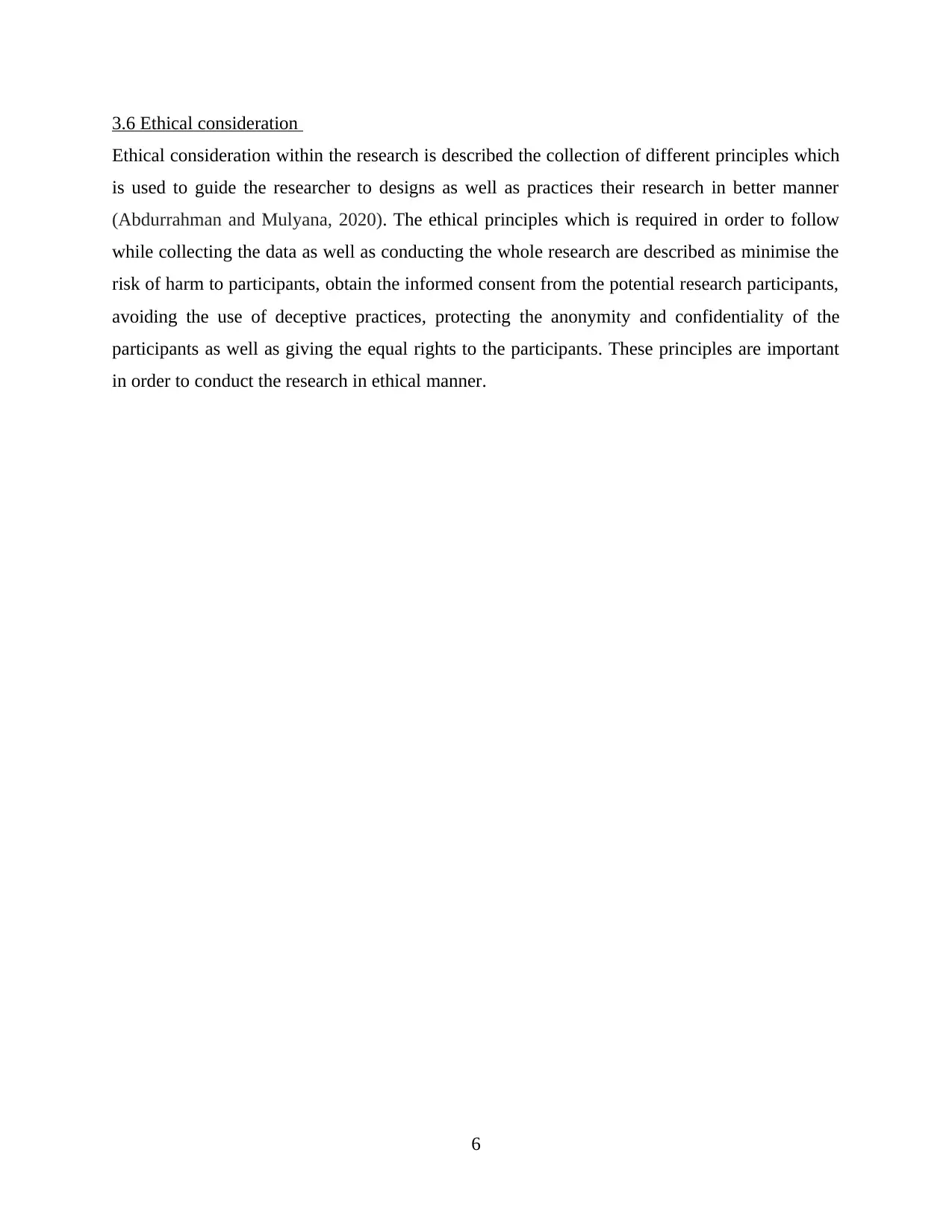
3.6 Ethical consideration
Ethical consideration within the research is described the collection of different principles which
is used to guide the researcher to designs as well as practices their research in better manner
(Abdurrahman and Mulyana, 2020). The ethical principles which is required in order to follow
while collecting the data as well as conducting the whole research are described as minimise the
risk of harm to participants, obtain the informed consent from the potential research participants,
avoiding the use of deceptive practices, protecting the anonymity and confidentiality of the
participants as well as giving the equal rights to the participants. These principles are important
in order to conduct the research in ethical manner.
6
Ethical consideration within the research is described the collection of different principles which
is used to guide the researcher to designs as well as practices their research in better manner
(Abdurrahman and Mulyana, 2020). The ethical principles which is required in order to follow
while collecting the data as well as conducting the whole research are described as minimise the
risk of harm to participants, obtain the informed consent from the potential research participants,
avoiding the use of deceptive practices, protecting the anonymity and confidentiality of the
participants as well as giving the equal rights to the participants. These principles are important
in order to conduct the research in ethical manner.
6
⊘ This is a preview!⊘
Do you want full access?
Subscribe today to unlock all pages.

Trusted by 1+ million students worldwide
1 out of 30
Related Documents
Your All-in-One AI-Powered Toolkit for Academic Success.
+13062052269
info@desklib.com
Available 24*7 on WhatsApp / Email
![[object Object]](/_next/static/media/star-bottom.7253800d.svg)
Unlock your academic potential
Copyright © 2020–2026 A2Z Services. All Rights Reserved. Developed and managed by ZUCOL.



